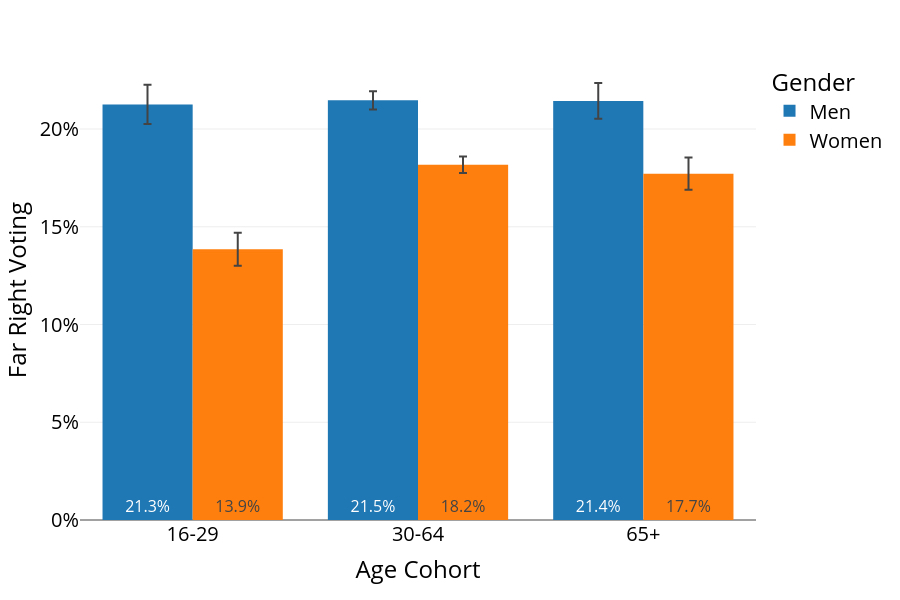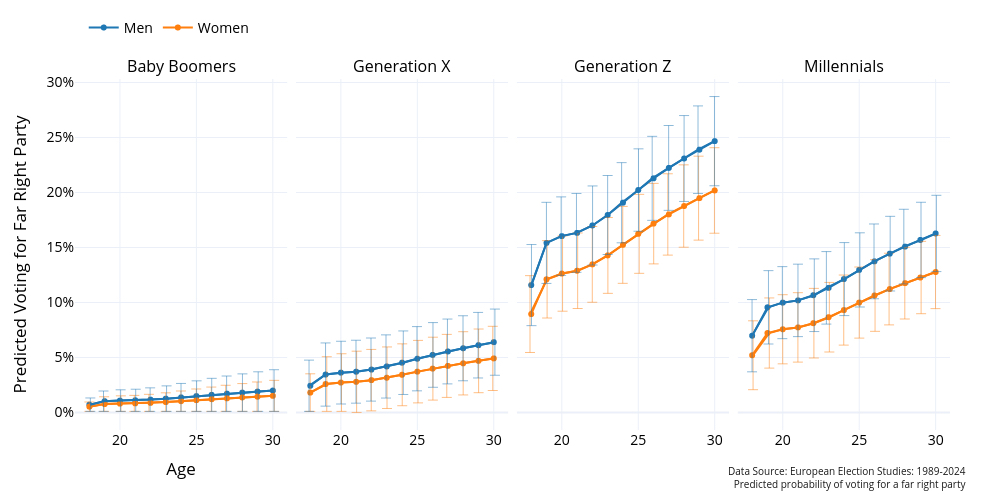Đorđe Milosav explores how young men are reshaping Europe's political landscape. Drawing on European Election Study data, and based on recent co-authored research, he shows that rising male support for the far right is a generational shift — with potentially serious democratic consequences
Young men and women are growing apart in how they think and feel about the world around them. Of course, there have always been political differences between the sexes. But current news stories, punditry, and popular TV series and movies all hint that these differences now risk spilling over into the political realm.
My new research article with Zachary Dickson, Sara B. Hobolt, Heike Klüver, Theresa Kuhn and Toni Rodon takes a closer look at gender differences in voting for far-right parties in Europe. Our paper compares the preferences of young (18–29), middle-aged (30–64) and older (64+) cohorts. We find that in Europe, the difference in far-right support between young men and women is roughly double that of middle-aged and older cohorts. In 2024, 21% of young men expressed support for far-right parties. For women of the same age group, the figure was just 14%. This gap appeared to widen rapidly after 2020, driven primarily by a sharp increase in support for the far right among young men.

A sceptic might say it is entirely possible that young men vote for the far right simply because they are behaving as society expects them to. They are exploring their identities, taking risks, and testing boundaries as they navigate their place in the world. This argument follows the notion that 'boys will be boys' and that men vote for the far right simply because they are less risk averse, more adventurous and less caring than their female counterparts about societal norms. Such reasoning implies that young men may naturally feel a stronger inclination toward far-right ideologies, and we therefore have nothing to worry about, because they will 'eventually grow out of it'.
The growing gap in far-right support between young men and women appears to be a distinct, generational phenomenon, most pronounced among Generation Z
Our paper takes advantage of longitudinal data and tests the idea that 'boys will be boys'. If this assumption is true, we would have expected to see similar voting patterns among previous generations when they were young. Our analysis, however, finds no such pattern. Instead, the growing gap in far-right support between young men and women appears to be a distinct, generational phenomenon. It is most pronounced among Generation Z (born 1997–2012) and, to a lesser extent, Millennials (born 1981–1996).

Indeed, given the significant societal changes over the past decade, what it means to be a young man today is far from clear. The idea that young men's political choices are merely a function of their age ignores the evolving nature of masculinity. Moreover, far-right parties are no longer outsider movements; they are increasingly gaining political power across Europe and beyond. As they move from the fringes to the mainstream, such movements cease to be merely a tool for provoking parents and teachers. Instead, far-right parties are becoming normalised. This is a tendency which may not simply fade with age.
In short, we don’t really know yet. However, there are a few ideas that seem worth exploring in future research. Countries around the world are experiencing growing economic anxiety and cultural shifts that challenge traditional notions of masculinity. Both these trends could encourage young men towards support for the far right. Rising housing costs, unstable job markets, and prolonged financial dependence on parents may leave many feeling stuck and frustrated.
Growing economic anxiety and cultural shifts that challenge traditional notions of masculinity could be encouraging young men towards support for the far right
At the same time, many young men may perceive the success of women in education and the workplace as a threat. This could fuel resentment and a desire for control. Social media, meanwhile, is filling this gap with 'manfluencers' promoting hyper-masculine ideals of self-discipline, wealth, and dominance. Such figures offer clear, appealing narratives to confused young men.
This environment creates fertile ground for far-right movements whose messaging mirrors the tone and appeal of online influencers. Far-right politics can offer a sense of purpose and validation to those who feel increasingly left behind.
During their formative years, young people are highly impressionable. The behaviours they develop in youth often tend to stick. Young people's thoughts and actions are shaped by family, peers, education, and social media. Casting a ballot for the first time could thus establish a voting habit that may guide a person's decisions in future elections.
Young men who back far-right parties today may continue to do so as they age, strengthening these movements over generations, and threatening the stability of European democracies
Our study offers an early warning that young men who back far-right parties today may continue to do so as they get older. Their support would strengthen these movements over generations, and could pose a threat to the stability of European democracies.
The concern isn’t just political. If the gender divide continues to widen, Europe could see even deeper societal polarisation — not just between left and right, but between men and women. This split could shape everything from election outcomes to workplace culture, dating dynamics, and even long-term demographic trends like marriage and birth rates.
The authors of the research paper on which this blog piece is based are grateful for generous support from the Volkswagen Foundation via The COVIDEU Project grant no.9B051
do we REALLY not know?
Men, especially young men, are unhappy that the way hey were raised taught them to expect, to feel ENTITLED to, the time, care and servitude of women.
That's what the far right offers them - regressing women's rights so that men can maintain their comfortable social superiority without having to put in any effort towards being a desirable partner.
Women are avoiding the right because of the exact same reason. Women finally have the space and rights to stand up and demand to be treated equally, and that the burdens of home, family and life be equally shared, rather than falling on us alone, on top of being expected to work all day.
Times are changing and young men are not liking the fact that their fathers and grandfathers, the whole system, raised them to expect a servile woman who is not materializing for them.
Rather than improve themselves, they (as humanity has ever done) are trying to exert legal and social power over women, rather than actually making efforts to become better men.
Sure, blame men & young men for the broken society YOU have created...
We are sick of the left's socialist/ communist attitudes - our forefathers, grand parents and great grand parents built the bricks, the roads, laid the foundations, the sewerage, the electrics, the cabling, the rails and the stations, even built nearly all the buildings around you - yet it's still not enough to just show us some suppport, dignity, respect and mutual care for the legacy our families put down. Not to mention, how many family members we may have each lost in WW1 / WW2 - half of my family, and yet am I given any perks for their sacrifices? no, none whatsoever... I am scapegoated and punished now - I don't fit the PC agenda anymore - and yet, they wanted my income contributions for over 20 years, and taxed me 60-75% on all of it in just one year - just to pay for others who have come fresh on a dinghy, and not contributed anything...
@Bronwyn -
This is nothing about ENTITLEMENT, to the time/ care/ servitude of women.
This article was not about women, and yet you have focused it all about your own side...
We dont hate you - we love you, but you think you can replace us with other men? Well, I've got news for you - replacement works both ways luv - you can be replaced too..
Fascism is the only hope for Germany and Europe as of 2025. I am a young man and I believe this with every cell in my body. Because the establishment and all left wing and center parties are already in servitude to Islam. Fascism is the only way to stop islamization of Europe, and this is our sacred duty. We want to put an end to so called "religious freedom" before it is too late.